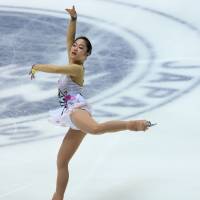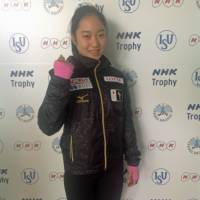Though the spotlight at the NHK Trophy was on the return to the ice of injured Olympic and world champion Yuzuru Hanyu and the battle for spots in the Grand Prix Final, the performance of Riona Kato was a revelation.
The 16-year-old finished a very respectable fifth in her senior GP debut, moving up from eighth place after Friday's short program with an excellent free skate. Her jumping was especially impressive, as she landed seven triples on Saturday to the delight of the crowd at Namihaya Dome.
Kato achieved a career-best total score of 168.38 points due to her strong free skate, which put her less than five points behind Sochi Olympian Kanako Murakami, who was fourth.
Ice Time spoke with Kato prior to Sunday's exhibition gala and she came across as both serious and determined. The high school sophomore has been training in Cathedral City, California, with renowned jump coach Anthony Liu for the past two years.
"I am striving to be like Yuna Kim and Ashley Wagner," stated Kato. "I want to express my feelings in my programs like they do. My goal is to be like them."
The Osaka native particularly admired the ability of the retired two-time Olympic medalist Kim.
"She was good at jumps and jumped high," noted Kato. "She was able to skate without showing pressure."
Kato got an early start in skating, first taking the ice at the age of 2 years and 8 months at the suggestion of a family member.
"My aunt (Yukari Kato) was a skating coach and she encouraged me," recalled Kato, who is now coached by both Liu and her aunt.
Kato, who finished third at the Junior GP in Slovakia last season, says her experience in another sport has helped her path as a skater.
"I trained as a gymnast when I was younger and that has been beneficial for increasing the height on my jumps through the years," Kato commented.
Kato's diminutive stature (she stands just 152 cm) would not normally be seen as an asset for jumps, but she credits Liu for making her even better in this area.
"He told me that I have to jump higher, because my jumps were looking like spins," she recalled. "He has made my jumps higher."
Liu was born in China, but moved to Australia when he was 20. He became a citizen two years later and went on to be a seven-time Australian champion. He competed in singles in two Olympics (Nagano — 1998, Salt Lake City — 2002) for his adopted country.
Liu coached Tatsuki Machida last season when he took the silver medal at the world championships.
After two years in the States, Kato says she has made inroads on learning a second language.
"I'm not usually a talkative person," she said. "But I can communicate well with my coach in English."
Kato, who was second in the Japan Junior Championships two seasons ago, has continued her studies at Nagaodani High School via correspondence while living in the U.S.
Before she began training under Liu, Kato worked with Mie Hamada, who currently coaches Satoko Miyahara.
"Hamada-san was good at teaching jumps," remembered Kato. "She taught me to first work on jumping without turns. This is why every time I get on the ice I first jump five times without turning."
Confidence game: While Hanyu struggled during the NHK Trophy, it appears that he is almost fully recovered from the injuries suffered during his collision with Yan Han at the Cup of China. But it seemed as if his confidence may be lacking when it came to his quadruple jumps.
He was unable to land a quad in either the short program or free skate, and one has to wonder if deep down he still may be a bit rattled by what happened in Shanghai and was concerned about hurting himself again. When you are attempting a four-rotation jump, you can't be worried about what happens if you don't make it.
With two more weeks of training ahead of the GP Final in Barcelona, Spain, hopefully the additional practice will allow Hanyu to return to his previous form and allay any lingering concerns associated with the accident last month.
Just missed out: Though it was disappointing that no Japanese women qualified for the senior GP Final, the fact that Rika Hongo, Miyahara and Murakami are the three alternates is still encouraging. One or more of them could still get in if another competitor pulls out before the event for some reason.
As it stands now, three of the 12 skaters in the senior GP Final will be Japanese — Tatsuki Machida, Takahito Mura and Hanyu.
Daisuke Murakami, who won the NHK Trophy, received just one GP assignment. He could have had the chance to join his compatriots in Spain if he had been given a second opportunity.




















With your current subscription plan you can comment on stories. However, before writing your first comment, please create a display name in the Profile section of your subscriber account page.